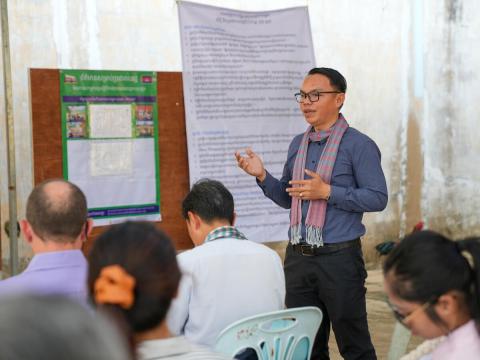Social accountability helps farmers tackle climate change

Farmers in Sambour commune, Cambodia, are overcoming climate challenges through improved irrigation and stronger community-government collaboration under the Implementation of Social Accountability Framework project. Investments in dam and canal rehabilitation are helping reduce water costs, protect livelihoods, and boost agricultural resilience.
Climate change severely affects Cambodia, especially its rural population who are reliant on agriculture and fish farming. In Sambour commune, Kralanh district, Siem Reap province, 4,000 families face increasing hardship. Droughts during the dry season reduce crop yields, while flash floods destroy livelihoods.
Water control, to prevent scarcity or excess and overflow, has been a persistent challenge. Farmers often purchase water from private sources, spending around 350,000 riels (US$ 90) per hectare per season.
Despite this, lack of sufficient water means fields remain unplanted and less income due to smaller harvests means farmers are forced to migrate. Destruction of crops from flooding has the same result. Uth Chhin, a 35-year-old farmer, recounts, ”The floodwaters destroyed both my house and rice fields, forcing us out of our homes.”
"I lost my beloved child due to the floods a few years ago,” shared Uth Chhin, a 35-year-old farmer from Sambour Commune. ”It was my biggest regret. The floodwaters destroyed both my house and rice fields, forcing us to move in with my mother during that time."
In 2024, change arrived in Sambour. The farming communities and commune administration united to address their challenges through the Implementation of the Social Accountability Framework (ISAF) project. This initiative, supported by the World Bank, the National Committee for Sub-National Democratic Development (NCDD), and World Vision, facilitated the process from dialogue between the administration and communities through to actions that tackle the pressing issues.
The Kralanh district administration hosted a multiinterface meeting where residents identified challenges and emphasised the need for improved irrigation. Mr. Yun Yong, a 54-year-old resident remarked, ”I’m happy and proud that the district administration allows us to evaluate its performance, ensuring alignment with government policies and demonstrating accountability and transparency.”
Following this social accountability exercise, the district administration incorporated the proposals into the Joint Accountability Action Plan (JAAP).
Since March 2024, investments have been made to rehabilitate the Spean Sreng Dam (5 km), repair the Metpeang Ambel Canal (7 km), and restore 51 additional canals (51 km), with the aim of irrigating 5,100 hectares of farmland.
"I’m happy and proud that the district administration allows us to evaluate its performance, ensuring alignment with government policies and demonstrating accountability and transparency." Yun Yong, 54-year-old citizen from Kralanh district.
These efforts are already reducing farmers’ water costs, supporting the transportation of agricultural products, and increasing preventive measures against flooding in future rainy seasons.
